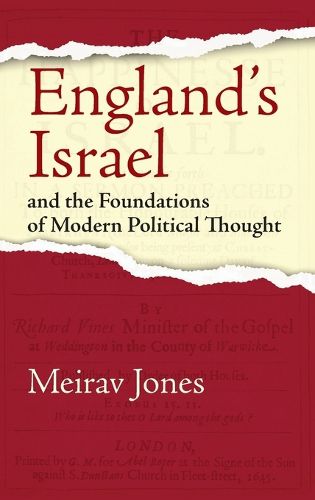Readings Newsletter
Become a Readings Member to make your shopping experience even easier.
Sign in or sign up for free!
You’re not far away from qualifying for FREE standard shipping within Australia
You’ve qualified for FREE standard shipping within Australia
The cart is loading…






The foundations of modern political thought, presumed secular, were laid in conversation with theologically motivated politics and in negotiation with Jewish ideas
Mid-seventeenth-century England was a hotbed in which crucial ideas of modern politics were conceived: Thomas Hobbes presented his social contract; John Selden wrote major treatises which were foundational for modern natural and international law; and England participated in the wave of republicanism that swept over Europe. This was also the period of the English Civil War--which has been portrayed as a "war of religion" and a "revolution of saints"--and was characterized by religious ends and motivations guiding politics and politicians.
In England's Israel and the Foundations of Modern Political Thought, Meirav Jones proposes that the foundational political theory conceived in this period was significantly related to the theological politics of the time. Through an examination of the language and imagery shared by theorists and saints, Jones finds that, in the twenty-year period between 1640 and1660, when Hobbes, Selden, and their contemporaries published, over 40 percent of all texts published in England contained one or more of the terms "Hebrew," "Israel," "Jerusalem," "Zion," or "Jew." Further, all known works of political theory from the period employed these terms. While preachers in English parliament addressed and understood England as "Israel," foundational theorists of the modern state employed ancient Israel as a political model and explicitly preferred Hebrew over Greek wisdom.
Modern politics did not develop solely from within a conversation among elites, neither was it conceived as a Godless enterprise, even by its most renowned secular architects. Instead, as the book demonstrates, it spoke the language of religiously motivated politics and was conceived in its terms. Ultimately, Jones argues that it was through a sweeping revival of Hebrew in early modern Europe that the foundations of modern politics were laid in conversation with theological politics and in negotiation with Jewish ideas and ideas of the Jews.
$9.00 standard shipping within Australia
FREE standard shipping within Australia for orders over $100.00
Express & International shipping calculated at checkout
The foundations of modern political thought, presumed secular, were laid in conversation with theologically motivated politics and in negotiation with Jewish ideas
Mid-seventeenth-century England was a hotbed in which crucial ideas of modern politics were conceived: Thomas Hobbes presented his social contract; John Selden wrote major treatises which were foundational for modern natural and international law; and England participated in the wave of republicanism that swept over Europe. This was also the period of the English Civil War--which has been portrayed as a "war of religion" and a "revolution of saints"--and was characterized by religious ends and motivations guiding politics and politicians.
In England's Israel and the Foundations of Modern Political Thought, Meirav Jones proposes that the foundational political theory conceived in this period was significantly related to the theological politics of the time. Through an examination of the language and imagery shared by theorists and saints, Jones finds that, in the twenty-year period between 1640 and1660, when Hobbes, Selden, and their contemporaries published, over 40 percent of all texts published in England contained one or more of the terms "Hebrew," "Israel," "Jerusalem," "Zion," or "Jew." Further, all known works of political theory from the period employed these terms. While preachers in English parliament addressed and understood England as "Israel," foundational theorists of the modern state employed ancient Israel as a political model and explicitly preferred Hebrew over Greek wisdom.
Modern politics did not develop solely from within a conversation among elites, neither was it conceived as a Godless enterprise, even by its most renowned secular architects. Instead, as the book demonstrates, it spoke the language of religiously motivated politics and was conceived in its terms. Ultimately, Jones argues that it was through a sweeping revival of Hebrew in early modern Europe that the foundations of modern politics were laid in conversation with theological politics and in negotiation with Jewish ideas and ideas of the Jews.